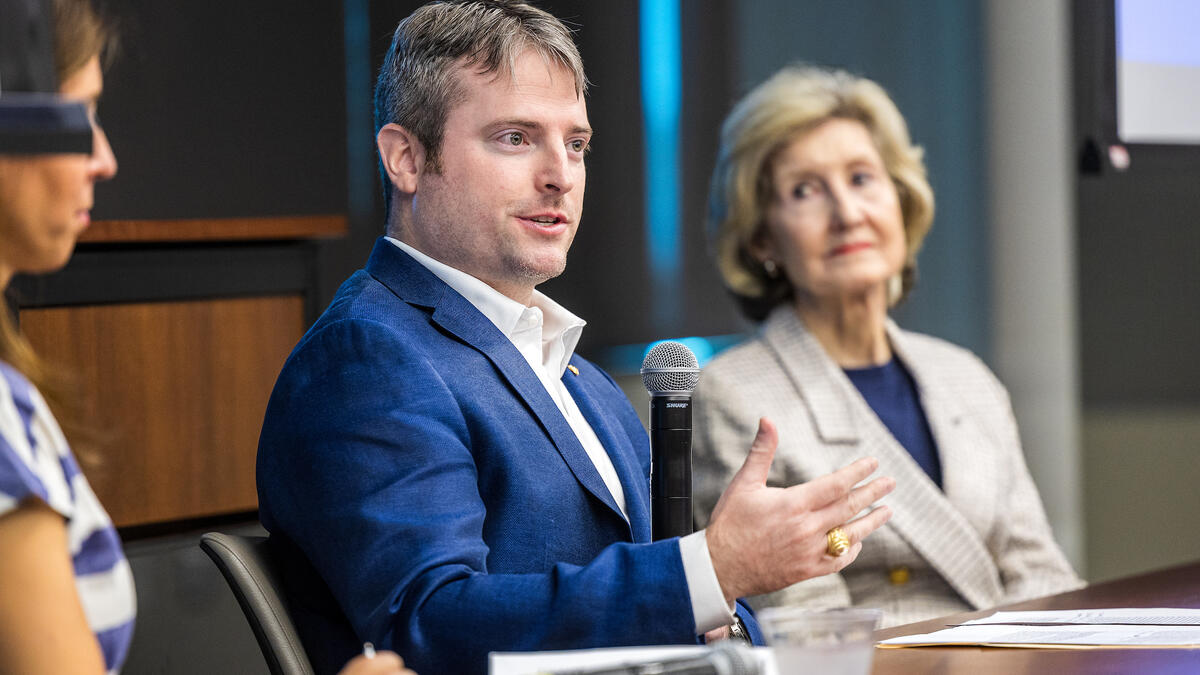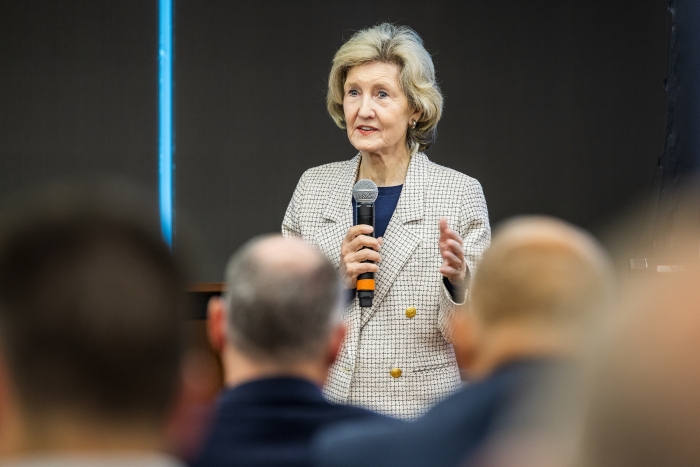Experts tout NATO as crucial in global fight to maintain democracy

Jack McCain, McCain Institute board member and son of the late Sen. John McCain, speaks during a panel discussion with Kay Bailey Hutchison (right) former U.S. ambassador to NATO, and McCain Institute Chief Program Officer Kristen Abrams (left) at the institute’s “Frontline of Freedom: NATO, Arizona, and the Fight for Democracy” event held on June 24 on ASU’s Tempe campus. Photo by Charlie Leight/ASU News
As NATO marks its 75th anniversary, the alliance is more important than ever in light of Russia’s attack on Ukraine and the global threat to democracy, according to experts who convened at Arizona State University on Monday.
The McCain Institute at ASU hosted a panel discussion at the Tempe campus highlighting the North Atlantic Treaty Organization and its role protecting security and democracy. The McCain Institute is an institutional partner for the upcoming NATO Public Forum 2024 taking place next month in Washington, D.C.
The event, “Frontlines of Freedom: NATO, Arizona, and the Fight for Democracy,” featured Kay Bailey Hutchison, the former U.S. ambassador to NATO from 2017 to 2021; Jessica Lewis, assistant secretary of state for political-military affairs; and Jack McCain, U.S. Navy Reserve aviator, McCain Institute board member and son of the late Sen. John McCain of Arizona, who inspired the creation of the nonpartisan organization, which is based in Washington, D.C.
Hutchison said her time as ambassador to NATO showed her that America must be the leader.
“The Europeans would never be able to rally together without us. We are the country that will assess a risk and then deter that risk,” she said.
She said that NATO was formed in 1949 to avoid catastrophic wars like World War I and World War II.
“And today, I would say that it is also for the survival of Western civilization, because now we are in a fight for our way of life,” said Hutchison, who was a Republican senator from Texas from 1993 to 2013.
Lewis said that the U.S. has provided more than $51.4 billion in security assistance to Ukraine.
“This is the fight of a generation for our way of life,” she said, adding that the U.S. has asked for transparency from Ukraine on how the money is allocated. The U.S. also has provided almost $2 billion in investments to countries to transition away from Russian weapons.
“Fundamentally what we’ve done is to launch an effort to reinvigorate what has been called the arsenal of democracy,” Lewis said.
“Looking at our security partnerships with NATO and our investment in Europe, I think Sen. McCain would have said that we’ve helped to give new meaning to the alliance.”
Jack McCain told a story about his time at the NATO base in Kandahar, Afghanistan, when troops from Romania, then one of the newest NATO partners, were chosen to secure the perimeter of the base. Every day he would see them drive off the base, then return hours later, sometimes with their truck badly damaged.
“They would ensure the physical security of the base not just from people attacking, but they would find IEDsimprovised explosive devices with their trucks, sometimes detonating them with their own vehicles,” he said.
“They were putting themselves, a much smaller, and frankly less capable, military than the United States, in harm’s way to protect American and NATO lives.
“That is the story of NATO. What else is there to say except for, if you want a peaceful and stable Europe because that makes a peaceful and stable United States, support NATO.”
Hutchison said that NATO did not act decisively when Putin attacked two provinces in Georgia in 2009 and Crimea in 2014.
“We put in sanctions and we walked away,” she said. “But if he's successful in seeing that America and NATO are just a lot of talk and no action, then he will surely, if he's successful in Ukraine, take the next step and it will be one of our NATO allies.”
McCain said that besides Putin, authoritarianism is on the rise globally.
“China feels emboldened because there is a narrative that is being spun to their benefit, to Russia's benefit, to North Korea's benefit, that democracy, that the idea of a free world, is not just alive but dangerous and unstable,” he said.
“Ukraine was invaded because it was a free nation having elections. … The example of the free world, the example of NATO standing up, is dangerous to them because that idea of a free human spirit is insidious in the best possible way. It drives people to greatness.”
However, the war against Ukraine has been disastrous for Russia in two ways, he said.
“Russia right now has bled their military white through sheer incompetence, corruption and through their inability to field their weapons systems the way they want to,” he said. “… It’s going to be a generation or more before they can become remotely capable as a military force.”
And second, countries that have purchased weapons from Russia have seen those anti-aircraft systems, tanks and armored personnel carriers fail in battle.
“This is quite possibly the best outcome for the United States that we can expect right now. And I look at it with great relish,” he said.
“Having been trained to go against weapons systems like that, it's wonderful to watch them fail and the world has taken notice.”
McCain continued his takedown of Putin, referring to the leader’s recent visit to North Korea to secure weapons, which prompted South Korea to announce that they would give weapons to Ukraine.
“He looked very dejected sitting down next to Kim Jong Un, kind of, ‘This is my life now’ with the North Korean propaganda going on,” he said.
“… He has again miscalculated.”
Hutchison said that the power of the NATO alliance also is economic.
“If we acted in concert, how would China get along? If the largest economies of the world, say the G20 plus, were not trading with them, were not investing in them, what would happen to their economy, what would happen to their country?” she said.
“There would be no jobs and no prosperity whatsoever.”
Regarding Trump’s frequent criticism of NATO, and the possibility of his re-election this November, she said that withdrawal from NATO is unlikely.
“No president can withdraw from NATO without a two-thirds vote of the Senate or a vote of Congress. That is law,” she said.
“And Congress is very much in support of NATO. This is bipartisan.”
More Local, national and global affairs

Video series tells story of 'Resettled People'
What better way for the story of former refugees to be told than having the refugees tell those stories themselves.That’s the idea behind "STEM Dreams in Motion: Stories of Resettled People."Using…

Department of State and ASU host Government Leaders Forum to strengthen semiconductor supply chains
By Emilia FrancoAs the global demand for semiconductors accelerates — with projections reaching $1 trillion by 2030 — Arizona State University, in partnership with the U.S. Department of State,…

Environmental writer, ER doctor address violence, climate change, more at sold-out ASU event
“The difficulty of understanding the consequences of heat is amplified by conventional notions of what it means to be hot. In pop culture, hot is sexy, hot is cool, hot is new…” That excerpt was…
